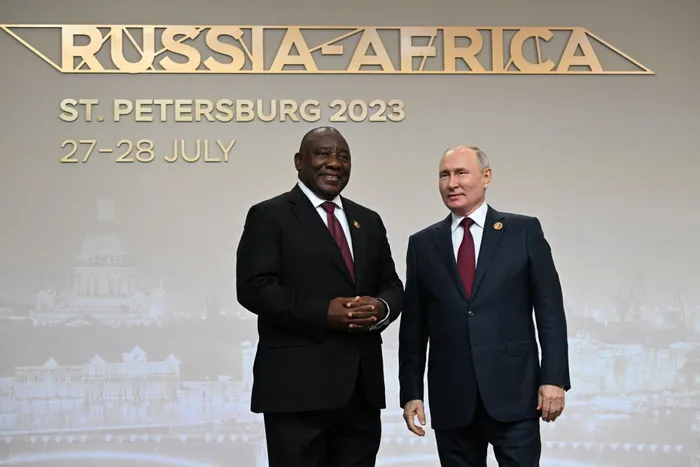Summit ends with commitments to co-operation across key sectors

Picture: Pavel Bednyakov/POOL/AFP/July 27, 2023 – Russian President Vladimir Putin greets South Africa’s President Cyril Ramaphosa during a welcoming ceremony at the second Russia-Africa summit in St Petersburg. The two-day summit was attended by delegations from 49 African states. The meeting has produced a 74-point joint declaration for collaboration on matters including security, trade, and the environment
By Tanupriya Singh
The second Russia-Africa Summit for Peace, Security, and Development concluded in the Russian city of St Petersburg on July 28. The two-day meet was attended by official delegations from 49 African countries and included 17 heads of state. The summit yielded various agreements and a joint declaration for co-operation on issues including security, trade, energy, and climate change.
“All our states confirmed their commitment to the formation of a fair and democratic multipolar world order based on the universally recognised principles of international law and the UN Charter,” Russian President Vladimir Putin said in a press statement after the conclusion of the summit.
“[T]he summit has again confirmed the firm resolve of both Russia and Africa to continue developing mutually beneficial partnership and seeking its new forms and areas,” he added.
The joint declaration signed by the government of the Russian Federation and governments of the 49 African States present, reaffirmed “the need to jointly oppose neo-colonialism, imposing conditions and double standards while not allowing these practices to deprive states and peoples of the right to make sovereign choices of their development paths.”
Speaking to Peoples Dispatch during the course of the summit, activist and analyst Kambale Musavuli said, “[T]he message that people should read is that Africa is at the centre of the change of the world, Africans are taking agency that did not exist before when we had the Berlin Conference …”.
“Africans are saying if we need to change the conditions of our people, we need to gain the expertise of the world … there is not one country that has the monopoly on how to solve the problems that African countries have, so Africans are saying ‘we are going to speak to the East [China and Russia], to the West, to the North, to the South’…”
One of the chief outcomes of the summit was the 181-point Russia-Africa Partnership Forum Action Plan 2023-2026 to strengthen “dialogue and co-operation” on matters related to politics, security, economy, trade and investment, agriculture, energy, transport, environment, and culture.
The meeting was held following the expiration of an agreement allowing the export of grain from Ukraine via the Black Sea. Addressing the summit’s plenary, Putin stated that of the 32.8 million tons of cargo that had been exported from Ukraine under this agreement, over 70 percent had gone to “high and above-average income countries, primarily to the European Union”. Meanwhile, countries including Ethiopia, Somalia, and Sudan had received less than 3 percent of these exports.
Putin announced that Russia would be ready to supply between 25,000-50,000 tonnes of grain for free to Burkina Faso, Zimbabwe, Mali, Somalia, Central African Republic, and Eritrea within the next three to four months. He also said that matters related to agricultural production on the African Continent, including support in the form of transfer of technology, had been discussed.
Among the leaders present at the summit was Captain Ibrahim Traore, the interim president of Burkina Faso, who came to power following a military coup in 2022 amid a wave of anti-imperialist and anti-French unrest in the country.
“Why does resource-rich Africa remain the poorest region of the world? We ask these questions and get no answers. However, we have the opportunity to build new relationships that will help us build a better future for Burkina Faso,” Traore said. “The heads of African states should not behave like puppets in the hands of the imperialists. We must ensure that our countries are self-sufficient, including as regards food supplies, and can meet all of the needs of our peoples…”
The inaugural Russia-Africa summit was held in Sochi in 2019. This year’s summit confirmed the “Sochi agreement” to hold these summits every three years and established a permanent dialogue mechanism for coordination across key issues including terrorism, food, environment, and information security.
On matters related to trade, Putin announced that the summit’s participating countries would “gradually switch to national currencies, including the rouble, in making financial payments on commercial deals”. This is a further indication of the increasing global shift towards “de-dollarisation” or trade between countries in either their own national currencies or a third currency to challenge the financial hegemony of the US.
A major driver of this shift is the BRICS group and the New Development Bank (NDB), which will offer countries an alternative not only in matters of trade, but critically, debt. Debt denominated in US dollars has continued to push countries further into economic crises while forcing them to turn to the US-dominated IMF and World Bank for austerity-driven loan agreements.
While speaking at the summit, Putin stated that Russia had written off $23 billion in debt for African countries and will allocate an additional over $90 million towards debt relief.
Putin met with the president of the NDB, former Brazilian President Dilma Rousseff, ahead of the summit. “The [NDB] should play a major role in the development of a multipolar, polycentric world … Our development strategy for the 2022-2026 period aims to draw about 30 percent of our funds from domestic markets. It is also very important to attract funds in different currencies, not just dollars and euros,” Rousseff had said.
This article was first published in Peoples Dispatch